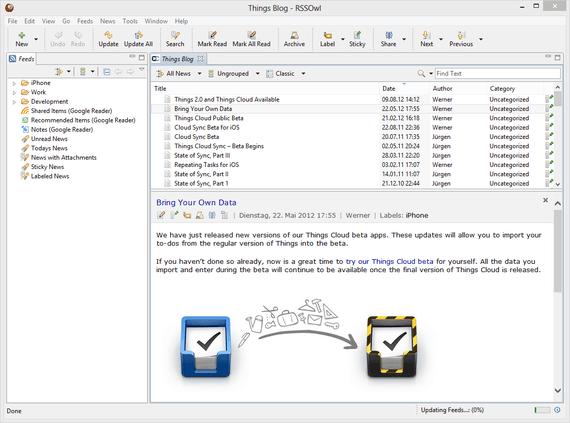

The difference between web-based and downloadable readers? A web-based reader will obviously aggregate your feeds onto one catch-all web page whereas an application that you install on your system delivers the feeds to your desktop and, by default, notifies you anytime a new story appears. We also highly recommend Newsfire or NetNewsWire for the Mac, both of which look and behave just like a native Apple application and cost around $20.00 to purchase. If you're a Mac OS X user, the latest versions of Safari have a built-in RSS reader that also hooks into a neat screensaver so you can have the latest ToffeeWeb news floating around your desktop when your machine is idle! As already mentioned, many web browsers now have RSS readers built in. Just Google "RSS reader" and the right-hand ads column alone will give you plenty of options, Newsgator being a good example. There is a plethora of RSS readers available for free download or free web-based subscription. Most of the major news sites now have feeds but ours was the first devoted to Everton that we know of. If you use Mozilla Firefox or Safari on the Mac, for example, an RSS icon appears on the far right end of the address bar of the browser whenever it detects a web page possesses an RSS feed (as should be visible now as you're browsing ToffeeWeb. Look for a icon, an XML icon or RSS icon somewhere on the front page or an "RSS" text link. By clicking on the news headline in your RSS reader, you get to read our summary of the story and then click through to the main report at In the case of ToffeeWeb's RSS feed, you would paste the URL into your reader to subscribe and receive updates whenever a story is added to or updated on our homepage. You then subscribe to RSS feeds from your favourite news sites by adding them to your reader.

The latest web browsers (including Firefox, Internet Explorer 8 and Safari) now come with in-built RSS readers that behave like bookmarks. In the main you use an RSS reader (there are many free ones available - just Google "RSS reader"), either by installing software on your PC or by signing up with a web-based service. A prime example is the BBC which offers feeds (or channels) for most of its news and sport sections. So, if you're a news junkie who logs on to the same sites multiple times a day looking for the latest news, you can have up-to-the-minute headlines "pushed" to your desktop where you can read a quick summary of the story and link through to the provider's website to read the full report. Since the advent of RSS (which originally stood for Rich Site Summary but is now known as Really Simple Syndication), however, you can be notified when your favourite sites have been updated via dedicated news feeds that arrive aggregated at a single source, in this case an RSS reader. The traditional way to get the latest news and information from frequently-updated websites like ToffeeWeb is to navigate to it using your web browser.


 0 kommentar(er)
0 kommentar(er)
